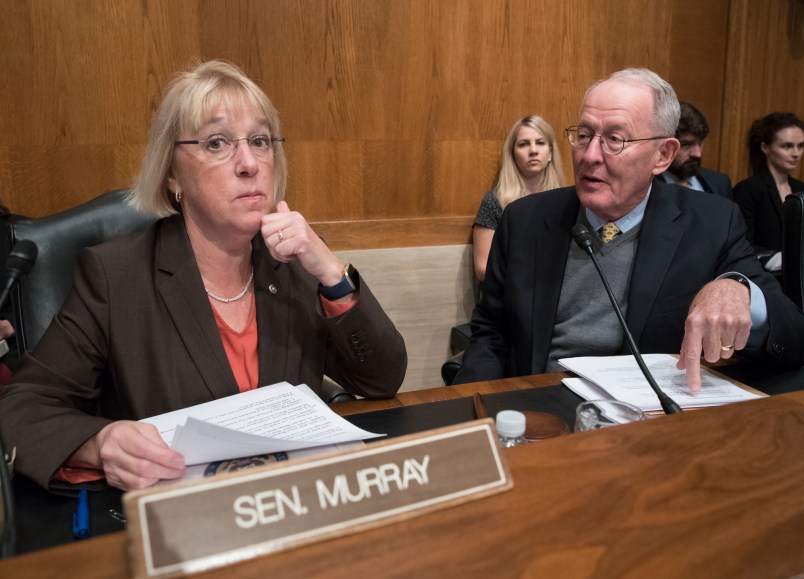Senators who have haggled for months over a deal to stabilize Obamacare’s individual market released the draft text of their bill late Tuesday night, and have since been attempting to sell the plan to their wary colleagues.
The proposal would fund cost-sharing reduction payments to insurers for two years, allow more people to buy skimpy “copper” health plans, make it easier for states to waive some insurance regulations, and undo the Trump administration’s deep cuts to the budget for urging people to sign up for Obamacare.
In separate memos obtained by TPM, Democrats and Republicans are making very different arguments in support of the deal, touting their victories in the negotiation and playing down the concessions they made to the other side.
As senators, armed with these talking points, start whipping votes, hostility to the deal from right-wing groups and House Republicans and near-constant position-shifting by President Trump could ultimately doom the effort.
In the memo circulating to Senate Republican offices this week, proponents of the plan argue that the bill will lower insurance premiums and allow states to implement changes to their health care systems—including reinsurance programs that would bring costs down by about 20 percent and trigger “NO new federal spending.” Under the bill, their memo says, states will cut their “federal waiver approval time in half” and enjoy “fast-track approval for emergency situations.” They argue that the new scheme will allow states to drastically rewrite Obamacare’s regulations, citing as an example a waiver application from Iowa that would benefit higher-income patients at the expense of the poor.
The memo ends with a stark warning about what will happen if Congress does not pass the bill: higher insurance premiums, more federal debt, and insurers fleeing the market and leaving Americans with zero plan options. This “chaos,” the memo cautions, will send Democrats on a “four-lane highway to single payer solution.”
The memo making its way around the Senate’s Democratic offices takes a much different tack by highlighting a provision that goes completely unmentioned in the GOP’s fact sheet: the restoration of the funding for open enrollment outreach.
The bill “mitigates the damage done by the Administration’s sabotage by restoring resources for outreach and enrollment before 2018 open enrollment begins,” the memo states, adding that it “requires HHS to increase funding for outreach and enrollment assistance activities for 2018 and 2019” and “puts in place extensive reporting requirements to make sure HHS and CMS are held accountable
for implementing open enrollment in 2018 and 2019.”
While it acknowledges the waiver provisions in the deal, the Democrats’ memo focuses more on what states would not be able to do. In bold, the memo emphasizes that the deal “would not affect any of the ACA’s core elements—like patient protections, tax credits, essential health benefits—that millions rely on.”
On Wednesday, Senate Minority Leader Chuck Schumer (D-NY) told reporters that both sides are attempting to recruit their colleagues with these arguments.
“What we’re going to try to do is get as many supporters on both sides of the aisle, probably an equal number, to co-sponsor the bill—like 10 and 10 or 15 and 15,” he said. “Then, I will urge Senator McConnell to move it to the floor. If that happened, I’m quite certain it would pass. Then there would be pressure on the House.”
Referencing President Trump’s numerous flip-flops on the bill this week and lamenting that he “can’t stick to a position,” Schumer added: “If the President would come out strongly for the bill and stick to that, that would help us.”
Read the Democrats’ memo:
Read the Republicans’ memo:







Excellent summary. Maybe it won’t get killed.
Even if it gets through the Senate, it’s hard to see it passing the House and getting Trump’s signature. But I suppose there’s always hope.
Selling a bipartisan deal is always tough. Doing it in a polarized Senate is very, very tough. Doing it in a political environment where the partisan fight is more important than anything else including the health of millions of Americans is almost impossible. I wish both Murray and Alexander good luck.
GOP will pretend the deal has failed until the next big deadline, most likely. December is going to be a doozy.